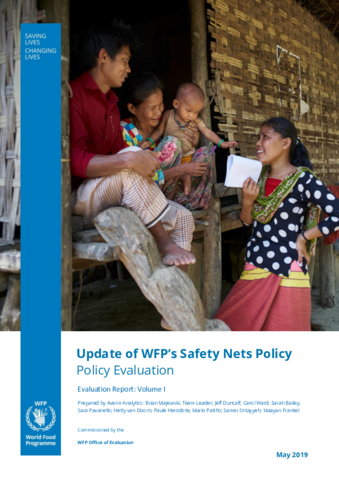
The “Update of WFP’s safety nets policy: the role of food assistance in social protection” was approved by the Executive Board in 2012. The evaluation covers the period from 2012 to 2017 while also considering more recent developments. It provides evidence, analysis and recommendations related to the Policy Update’s quality and results and to the factors that influenced those results.
The evaluation was timely given the considerably growth in the use of safety nets and social protection since 2012 by all governments around the world, focus of SDG 1 on ending poverty, including through the use of national social protection systems and measures, and increased use of cash-based transfers and social protection systems in times of shock.
The evaluation concluded that the WFP Policy Update was relevant and remains important; it provided a legitimacy for WFP’s engagement in safety nets. However, the narrow focus of the policy on safety nets neglected to position WFP in a broader social protection context and the lack of clear results framework, poor dissemination of the policy and guidance hampered uptake.
Growing country office and regional bureau experience with social protection provides a platform to further develop WFP’s complementary approach with other actors. However, senior management prioritization for WFP work in social protection remains unclear. As a cross-cutting, policy-oriented topic, it remains challenging to define and operationalize upstream social protection work and ensure coordination across WFP and with other actors.
The evaluation made five recommendations:
- WFP leadership should confirm and sustain its commitment to supporting nationally-led social protection. A strategy for engagement in social protection should be developed and disseminated.
- Strengthen mechanisms for coordination in social protection to ensure coherent cross-functional approaches.
- WFP should develop a knowledge management component of the social protection strategy.
- Identify the dedicated human, technical and financial resource requirements for building sustainable internal capacities in social protection.
-
Standardize monitoring of and reporting on WFP’s contributions to social protection to establish a reliable base of quantitative and qualitative evidence on WFP’s role and added value, and to enhance learning.
